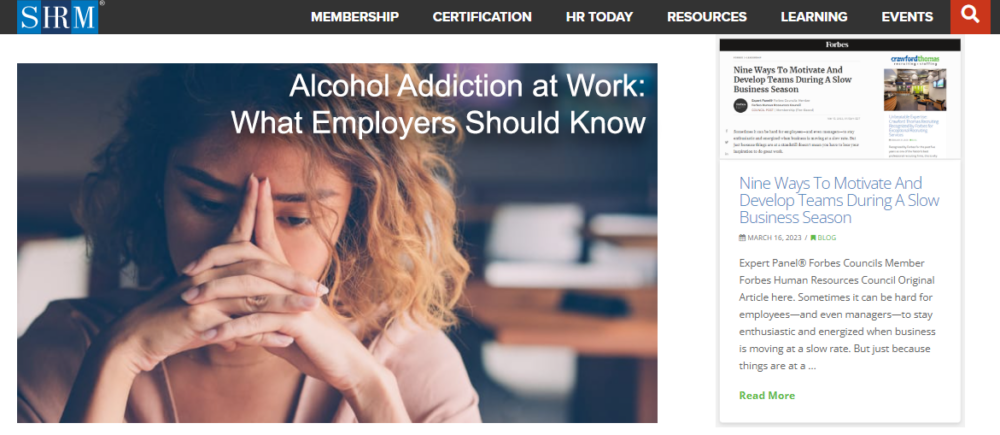Original Article here.

Jessica Dueñas was determined to keep her secret.
In 2019, Dueñas was a special education teacher at a middle school in Louisville, Ky., who had just been named the Kentucky Teacher of the Year. She was well respected by her colleagues for her work ethic and for the connections she forged with her students.
But Dueñas believed that if the school knew she was struggling with alcohol addiction, her flourishing career would crumble.
“I was a model employee, but I was so scared of people knowing I had an issue with alcohol,” she said. “I would go above and beyond at work so nobody could possibly think I had a problem.”
Federal data shows there are nearly as many adults in the U.S. who deal with alcoholism, also called alcohol use disorder (AUD), as there are residents of Texas. Individuals who have alcoholism experience myriad physical and mental health effects that can compromise their personal and professional lives.
Dueñas, who eventually left teaching to enter rehab and has been sober since November 2020, said there is a high likelihood that HR professionals have an employee who is now dealing with or has previously struggled with alcohol addiction.
“If you have 10 employees, one likely has a problem with alcohol,” she said. “It’s important for employers to be aware and make employees understand that help and resources are available.”
Alcoholism Harms Workplace Productivity
Alcoholism is a severe brain disorder. For some people, the transition from controlled, occasional drinking to chronic use can be difficult to control and result in AUD, according to the National Institute on Alcohol Abuse and Alcoholism.
“This complex and chronic disease can lead to impaired decision-making, decreased productivity and absenteeism,” said Allison Walsh, vice president of clinical outreach for mental health company Charlie Health in Bozeman, Mont.
Walsh served as an executive for Advanced Recovery Systems, a behavioral health company based in Fort Lauderdale, Fla., for nearly a decade. During that time, she helped open several rehabilitation centers that treat AUD.
“The effects of alcohol use disorder can be potentially devastating, affecting not only the individual but also the workplace as a whole,” Walsh added.
The Centers for Disease Control and Prevention estimates that societal costs due to excessive drinking largely stem from losses in workplace productivity (72 percent of the total cost), health care expenses (11 percent), and other costs related to criminal justice expenses, motor vehicle crashes and property damage.
Alcohol addiction and abuse can lead to additional workplace problems, including:
- Frequent tardiness.
- Patterns of absence, such as the day after payday.
- Missed deadlines.
- Careless work or incomplete assignments.
- Drastic changes in mood or behavior.
- Strained relationships with co-workers.
However, some people remain highly functional at work despite having AUD. But these individuals can still experience severe complications over time, such as alcohol-associated liver damage or pancreatitis, if their disorder goes untreated.
Tips for Supporting Employees with AUD
William Stonehouse III, president and co-founder of Crawford Thomas Recruiting in Atlanta, said employers should approach the situation with “empathy and fairness” if they learn an employee is struggling with alcohol abuse.
“Their conversation [with the employee] should absolutely be held in private and documented, support should be offered and confidentiality ensured,” he said. “Alcohol abuse or addiction can be a lifelong struggle for many, so follow-up is important.”

Additional tips for organizations to support workers battling AUD include:
- Ensure there’s a comprehensive employee assistance program (EAP) in place to provide resources and additional support.
- Be proactive and seek out additional local and virtual resources if their EAP does not have sufficient support.
- Offer flexibility in work arrangements, such as time off to address AUD.
- Provide alcohol-free options during group gatherings that involve alcohol.
- Avoid using stigmatizing language—such as referring to individuals or groups as “alcoholics” or “drunks”—when discussing alcohol addiction.
Dueñas also recommended that HR managers occasionally send employees e-mails reminding them about available health care benefits and EAPs. Meanwhile, people managers should try to be in tune with the workloads and stress levels of their employees.
“High stress affects people with alcohol use disorder because alcohol consumption is normalized as a way to cope when there is stress,” Dueñas said. “When people get more things placed on their plates and start to experience overwhelm, someone who copes by escaping via alcohol is likely to lean more on the substance, thus making their disordered use even worse.”
Crawford Thomas Recruiting:

Crawford Thomas is a team of leading HR recruiters. We not only fill staffing needs, we partner with organizations to find out how their recruiting needs tie into their business objectives. Through this, we are able to meet your staffing needs in a way that achieves organizational success.
Start securing top talent by visiting our page for employers today.

